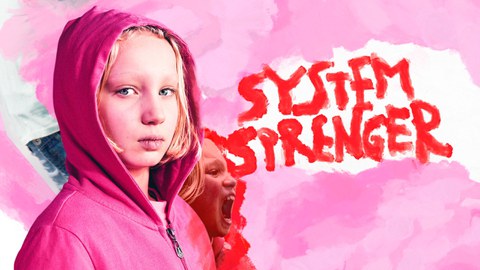07.07.2025
Zwischenmenschliche Berührung und Vertrauen im Film Systemsprenger
Der 2019 erschienene Film „Systemsprenger“ von Nora Fingscheidt bietet ein tief emotionales und komplexes Porträt des jungen Mädchens Benni mit ihren Problemen. Benni, die unter intensiver Wut und Aggression leidet, wurde vom Jugendamt, das ihr eigentlich helfen sollte, im Stich gelassen. Der Film unterstreicht, wie Traumata, Vernachlässigung und systemische Störungen ihr Verhalten prägen und ihre Fähigkeit, Vertrauen zu knüpfen und gesunde Bindungen aufzubauen, beeinträchtigen. Diese Darstellung ist nicht nur eine filmische Auseinandersetzung mit dem Kampf eines jungen Mädchens, sondern kann auch im Rahmen der psychologischen und neurobiologischen Forschung zu Trauma und Berührung betrachtet werden.
Neuere Forschungen wie die 2024 erschienene Arbeit „Out of touch? How trauma shapes the experience of social touch – Neural and endocrine pathways“ erweitern unser Verständnis dieses Zusammenhangs. Die Studie beschreibt detailliert, wie frühe Traumata die Art und Weise verändern, wie Gehirn und Körper soziale Berührungen verarbeiten – nicht nur psychologisch, sondern auch durch spezifische neuronale und hormonelle Veränderungen. Dazu gehören eine erhöhte Bedrohungsempfindlichkeit in Hirnregionen wie der Amygdala, dysregulierte Oxytocin-Systeme und eine geschwächte Fähigkeit, Berührungen als affiliativ statt als aufdringlich zu interpretieren.
In „Systemsprenger“ wird dieser Zusammenhang zwischen Trauma und Körper deutlich in Bennis Abneigung gegen Berührungen, insbesondere im Gesicht. Ein besonders eindringliches Motiv ist ihre Weigerung, jemanden an ihr Gesicht heranzulassen, die in einer traumatischen Erinnerung an Erstickungsanfälle im Säuglingsalter wurzelt. Laut der Studie entwickeln traumatisierte Personen häufig eine sogenannte „Berührungsdysregulation“ – eine veränderte oder stumpfe Reaktion auf affektive Berührungen, die normalerweise beruhigend und vertrauensbildend wirken. Für Benni hingegen wird Berührung, die eigentlich Sicherheit symbolisieren sollte, als Bedrohung kodiert, und ihre heftigen Reaktionen sind nicht willkürlich, sondern neurobiologisch begründet.
Die differenzierte Darstellung ihrer schwankenden Reaktionen im Film (mal Nähe suchen, mal zurückschrecken oder um sich schlagen) spiegelt auch das wider, was die Studie als typisches Merkmal eines Traumas identifiziert: Inkonsistenz in der Berührungswahrnehmung. Ursache hierfür ist eine Dysregulation in mehreren Systemen, darunter dem somatosensorischen Kortex, der Inselrinde, dem Hippocampus und den oxytocinergen Netzwerken, die alle steuern, wie wir Sicherheit, Schmerz und Beziehungssignale verarbeiten.
Eine besonders eindrückliche Szene zeigt Benni, wie sie still die Berührung eines Babys akzeptiert. Anders als die Erwachsenen um sie herum geht von dem Säugling keine Bedrohung aus, er kontrolliert nicht und urteilt nicht. Die Studie untermauert diese Dynamik: Der Kontext spielt eine entscheidende Rolle für die Wahrnehmung von Berührung nach einem Trauma. Sichere, sanfte und nicht-invasive Berührungen, insbesondere von Gleichaltrigen oder neutralen Personen, können die von Autoritätspersonen ausgelösten Abwehrmechanismen umgehen. Dies steht im Einklang mit der Empfehlung der Arbeit, dass Berührungsinterventionen sanft, vorhersehbar und auf die individuelle Traumageschichte abgestimmt sein müssen.
Darüber hinaus betont die Studie, dass diese neurobiologischen Veränderungen keinen irreparablen Schaden bedeuten. Vielmehr legen sie nahe, dass das assoziative Potenzial der Berührung unter den richtigen Bedingungen reaktiviert werden kann. Dies ist die stille Hoffnung des Films: Dass Bennis Nervensystem unter den Schichten des Schmerzes noch immer die Fähigkeit zur Verbindung in sich trägt, sofern diese sicher erreicht wird.
Fazit
„Systemsprenger“ bietet eine eindringliche Dramatisierung dessen, was die Wissenschaft bestätigt: Frühe Traumata prägen die Schaltkreise, durch die wir Berührung, Vertrauen und Sicherheit erfahren. Bennis Geschichte ist nicht nur verhaltensbezogen, sondern auch neurobiologisch. Der Film steht im Einklang mit den Ergebnissen der Studie aus dem Jahr 2024, die zeigt, wie Traumata die Reaktion des Gehirns auf zwischenmenschliche Berührungen verändern. Dies legt nahe, dass Heilung möglich ist, allerdings nur, wenn man mit tiefer Sensibilität für die verkörperte Natur des Traumas anspricht. So wird der Film mehr als nur eine Erzählung. Er wird zu einem Spiegel der Forschung und zu einem Aufruf zu einer traumainformierten Versorgung, die die verborgenen Wege erkennt, durch die Verbindung wiederhergestellt werden kann.
Einige Fragen zum Nachdenken:
- Wie können Betreuer und Therapeuten die Voraussetzungen dafür schaffen, dass sich Traumaüberlebende wieder sicher berühren können?
- Warum toleriert ein Kind wie Benni Berührungen von einem Kleinkind, aber nicht von Erwachsenen?
„Systemsprenger“ ist auf vielen Streaming-Diensten verfügbar. Um zu erfahren, wie unsere Forschung zu Berührung und Vertrauen mit diesem Thema zusammenhängt, besuchen Sie: https://ceti.one/irenevalori/

